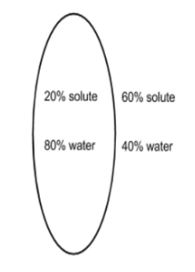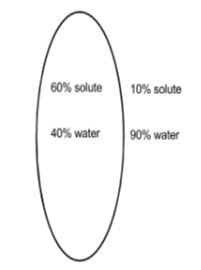Interactions
This organ system is responsible for filtering the blood and helps maintain fluid levels
What is the excretory system
How do the respiratory system and circulatory system interact?
What is the lungs remove CO2 from the blood and replace it with oxygen
Diffusion is when things move from _____________ to _____________
What is high concentration to low concentration
What does it mean for a solution to be isotonic? Which direction will water move?
What is the solute concentration is the same inside and outside the cell. Water will not move.
What are the inputs/reactants?
What is glucose and oxygen?
Define negative feedback.
What is a process that reverses or reduces a change to maintain balance/homeostasis?
This system is the control center of the human body; it receives and sends signals to the other body systems.
What is the nervous system
Which 2-3 systems interact to ensure glucose and oxygen reach our muscle cells when exercising?
What are the respiratory, circulatory, digestive system
Describe the difference between solute & solution with an example.
A solute dissolves in a solvent; a solution is a mixture of a solute and a solvent.
solute: Salt
Solution: Salt water
What does it mean for a solution to be hypotonic? Which direction will water move?
The solution has a lower concentration of solute than the cell. Water will flow into the cell.
What are the outputs/products?
What are carbon dioxide, water & ATP?
Define positive feedback
What is a process that amplifies a change until the goal is reached?
This system is responsible for gas exchange in the alveoli of the lungs.
What is the respiratory system
These body systems work together to cool you down.
What are the integumentary, circulatory, and nervous system?
There is a higher concentration of glucose outside the cells than inside. Which direction would glucose flow?
What is inside the cell
What does it mean for a solution to be hypertonic? What direction will water move?
The solution has a higher concentration of solute than the cell. Water will flow out of the cell.
This is the site of aerobic cellular respiration.
What is the mitochondrion?
How does the body respond when there are low levels of water in the body?
conserve (save) water by increasing solute concentration in urine.
This system includes the blood, heart and blood vessels.
What is the circulatory system
When you've consumed large amounts of water, which 2-3 body systems work together to ensure homeostasis?
What are the excretory, nervous, and circulatory system.
A young and healthy runner died unexpectedly after a race. He prevented himself from feeling thirsty by drinking lots of water before, during, and after the race. During his autopsy, the doctor took a sample of his cells and noticed they were enlarged and many had even burst. What happened to him?
What is too much water entered his cells through osmosis
What kind of solution is this? What direction will water move?

What is Hypertonic, water will move out of the cell
Anaerobic respiration does not require __________ but aerobic respiration does.
What is oxygen?
What are 4 things that can happen to increase your body temperature on a cold day?
What are "Drink a hot beverage, constrict blood vessels, put on a jacket, shiver"
This organ system is responsible for producing sweat and protection from the external environment.
What is the the skin (integumentary system)
What 3 systems which are involved in keeping you warm when you're cold, and what do they do?
Muscular system - shivering
Circulatory system - constrict blood vessels
Nervous system - trigger both other responses
What Would Happen if a Freshwater Fish Was Placed in Saltwater?
be sure to use scientific vocabulary!
What is the fish will severely dehydrate due to the high salt concentration in its surrounding environment; water will leave the fish's cells due to osmosis, which can lead to failure & death.
What kind of solution is this? What direction will water move?

What is Hypotonic, water will move into the cell
Anaerobic respiration produces ____ ATP molecules while aerobic respiration poroduces _____ ATP molecules.
What are 2 and 34-46?
An individual goes for a run on a hot day. As a result of excessive sweating, the amount of urine produced by the kidneys will change. How will it change and why?
What is "The amount of urine produced will decrease in order to conserve water"